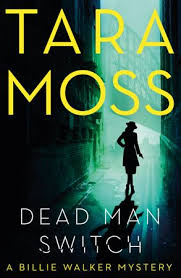Best-selling author Tara Moss is a sought-after public speaker, an advocate for women’s and children’s rights, a UNICEF Ambassador for Child Survival AND an accredited private investigator. But her career as an author began 20 years ago with her debut novel Fetish, and she has returned to her crime writing with a new series featuring a dashing, fabulously stylish heroine, PI Billie Walker, in her novel Dead Man Switch (Harper Collins 2019).
Set in Sydney in 1946 in the aftermath of World War Two, Dead Man Switch is a return to the hard-boiled detective novels of the era, but with a twist: Billie Walker is not your typical private inquiry agent; she’s smart, sexy, resourceful, determined and of course, she’s a female operating in what is very much a man’s world. The war has claimed her beloved husband Jack and she misses her life with him terribly, not only their intimate relationship but their work together as journalist and photographer, recording the horrors revealed at the close of the war. Now Billie is back in Australia and has inherited her late father’s detective agency. Most of her work involves following cheating husbands, but a new case – the disappearance of an adolescent boy – is proving to be much more of a challenge, and she soon finds herself deep in the murky world of smugglers, murderers and gangsters.
Billie is a fantastic character with so much potential for future novels in this series. Her backstory is interesting and her feisty personality and no-nonsense attitude make her a heroine we want to champion right from the start. Her love of the finer things in life – beautiful clothes, good food and wine, a fast car – do not detract from her pragmatism, but only add to her charm. And the other characters introduced in this book, who will no doubt continue to feature in future books in the series, are also well-drawn and memorable, particularly her eccentric mother, Ella (and her companion Alma) and Billie’s staunch, capable, loyal, endearing (and rather attractive) secretary-cum-assistant, Sam. Other minor characters, from lift operators to policemen (and women), from the villains to the victims, are drawn with care and detail.
In Dead Man Switch, Billie is working two cases: firstly, the young man who has disappeared under mysterious circumstances, which only become more sinister as she digs further into the details; and secondly, the anxiety of a young Aboriginal woman for her friends who she worries may be in a compromising situation. The research around the circumstances of Indigenous people at the time, and the laws under which they were forced to live, feels authentic and plausible. One particular girl, Shyla, is another great character who I hope may continue to appear in forthcoming books.
The research generally for this novel is painstaking, detailed and meticulous. The era of post-World War Two is replicated in everything from the rationing to the clothing, from the food to the societal views. Returned disfigured soldiers are common, and the novel makes clear the legacy of war and the trauma faced by those who survived.
But at the heart of this story is the strong female character of Billie herself – a self-possessed and persistent woman who is determined to live life on her own terms. She often faces discrimination and negative attitudes, but her resourcefulness and grace, her wit and cheeky sense of humour, her compassion and fearlessness (and her good taste) stand her in good stead for whatever challenges and obstacles she endures. Her ‘woman’s intuition’ often kicks in (‘the little woman in her stomach tells her something is wrong’) and she relies on this sixth sense as much as her knowledge, her experience and the small Colt pistol strapped to her garter.
An interesting addition to this fictional story is the inclusion of the very real historical character Lillian Armfield, one of the first female police officers to join the force in 1915 (and well documented in Leigh Straw’s non-fiction book ‘Lillian Armfield: How Australia’s first female detective took on Tilly Devine and the Razor Gangs and changed the face of the force’). The two women’s paths cross on several occasions, and Billie and Lillian share a similar robust ambition and business-like attitude to their professions.
This is a fast-paced crime story that really picks up speed as it rockets towards its conclusion. The characters are nostalgic, the era well-researched, and the plot tense. But no matter how bad the situation in which Billie finds herself embroiled, she retains her impeccable manners, her good taste, her sense of humour and her mischievous and chipper attitude.

